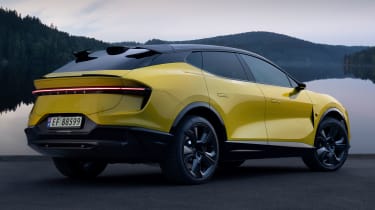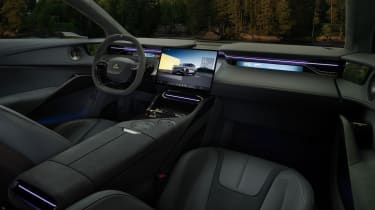New Lotus Eletre is Britain’s answer to the Tesla Model X Plaid
The first-ever Lotus SUV is now available to order, offering 373 miles of range and 0-62mph in sub-three seconds
Lotus, famous as a purveyor of lightweight sports cars such as the Elise and Esprit, has finally caved-in to exceptional customer demand and decided to make an electric SUV. Badged the Lotus Eletre, the British maker’s first 4x4 is designed to rival the likes of the BMW iX, Polestar 3, Mercedes EQE SUV and Tesla Model X.
On sale now from £89,500, the Lotus hyper-SUV is offered in three variants: the Eletre, Eletre S and flagship Eletre R, with all three featuring a dual-motor powertrain and a 112kWh battery.
The base model and Eletre S both output 595bhp and 710Nm of torque, enough to reach the 62mph benchmark in 4.5 seconds – a whisker quicker than the top-spec BMW iX M60. Perhaps even more impressive is that, if you can manage to drive with some restraint, Lotus says both models offer a range of up to 373 miles.
If you’re after the ultimate in performance, you’ll be drawn to the £120,000 Eletre R; this pumps out a total of 893bhp and 985Nm of torque and slashes the electric hyper-SUV’s time 0-62mph time to 2.95 seconds. That’s almost as fast as the now-left-hand-drive-only Tesla Model X Plaid, although the Lotus’s extra performance also means range is reduced to 304 miles for the Eletre R.
Thanks to the Lotus’ 800-volt electrical architecture, the Eletre can go from 10-80% charge in just 20 minutes if you plug it into a 350kW ultra-rapid charger. Charging at home can be done at up to 22kW if you have the necessary three-phase electrics, but if not a regular 7.4kW home wallbox is likely to take close to 17 hours to fill the Lotus’ battery. There are charging ports located on both sides of the car for easier access.
One performance-orientated feature of the Eletre is torque vectoring by braking, which should help with handling in the five-metre-long SUV. Meanwhile, rear-axle steering is designed to improve manoeuvrability at lower speeds, as well as stability at high speeds.
The Eletre rides on active air suspension and 22-inch wheels as standard (20 or 23 inch items are also available), which sit in front of a set of four-piston carbon-ceramic brakes. Drivers also have a choice of six driving modes: Range, Tour, Sport, Off-Road, Individual and, on the high-performance Eletre R, Track.
Lotus says the Eletre has the “most advanced active aerodynamics package on any production SUV”, with its bodywork having been “carved by air”. Some of the most notable design choices include Matrix LED headlights at the front, plus a sloping roofline, full-width light bar and an electronically-adjustable ‘floating’ split spoiler at the rear.
As mentioned, the Eletre measures over five metres long and stands 1.63 metres tall. Width ranges from 2.1 to 2.2 metres depending on whether the optional digital wing mirrors are fitted. There’s up to 688 litres of boot space on offer, or 1,532 litres with the rear seats folded down, plus a 46-litre ‘frunk’ under the bonnet.
At the heart of the Eletre’s cabin is a 15.1-inch central infotainment touchscreen which, according to Lotus, allows for 95% of the car’s functions to be accessed by three or fewer inputs. The central screen is flanked by two slim digital instrument panels: one for the driver and another for the front passenger. On top of those displays are LED strips that change colour to illustrate things like an incoming phone call or changing cabin temperature. The driver also benefits from a standard augmented-reality head-up display, plus wireless smartphone charging, Apple CarPlay and Android Auto connectivity.
As standard, the Eletre comes with five seats, but it’s available with a four-seater layout as part of the Executive Seat Pack. In this version, the middle seat is replaced by a centre console with two cupholders, a wireless charging tray and a nine-inch angled touchscreen with controls for the main infotainment screen. One drawback of this configuration is that it reduces the Eletre’s boot space from 688 litres to 611 litres.
One thing you won’t find in the Eletre’s cabin is leather. Instead, Lotus has used microfibres for key touchpoints and wool-blend fabrics for the upholstery, because they're 50% lighter – in-keeping with the brand’s philosophy of “simplify, then add lightness”. There’s also sporty carbon fibre trim on harder surfaces, which is lighter than metal or wood alternatives.
As the most ‘connected’ Lotus yet, the Eletre gets a wide array of advanced driver assistance systems, ranging from adaptive cruise control and road-sign recognition, to lane-keep assistance and collision mitigation. Several of the Eletre’s systems use data from the car’s deployable LIDAR sensors, which remain hidden until they’re needed, protruding from the top of the windshield and rear glass and from the front wheelarches.
This LIDAR technology, combined with other sensors and cameras around the car, should allow for some level of autonomous driving. The Eletre will be able to receive over-the-air (OTA) software updates from Lotus, plus owners can buy new software-based features as well. A dedicated smartphone app will allow owners to check vehicle and charge status, as well as carrying out other functions.
In the UK, the Eletre is covered by a five-year, 100,000-mile warranty, plus Lotus will provide roadside assistance across Europe for five years after it leaves the maker’s brand-new factory in China. UK customers can expect to receive their cars later in this summer.
Recommended

EV Deal of the Day: Dacia Spring is amazingly good value at £116 per month

EV Deal of the Day: budget-friendly Ford Capri for just £234 a month
Most Popular

EV Deal of the Day: Dacia Spring is amazingly good value at £116 per month







